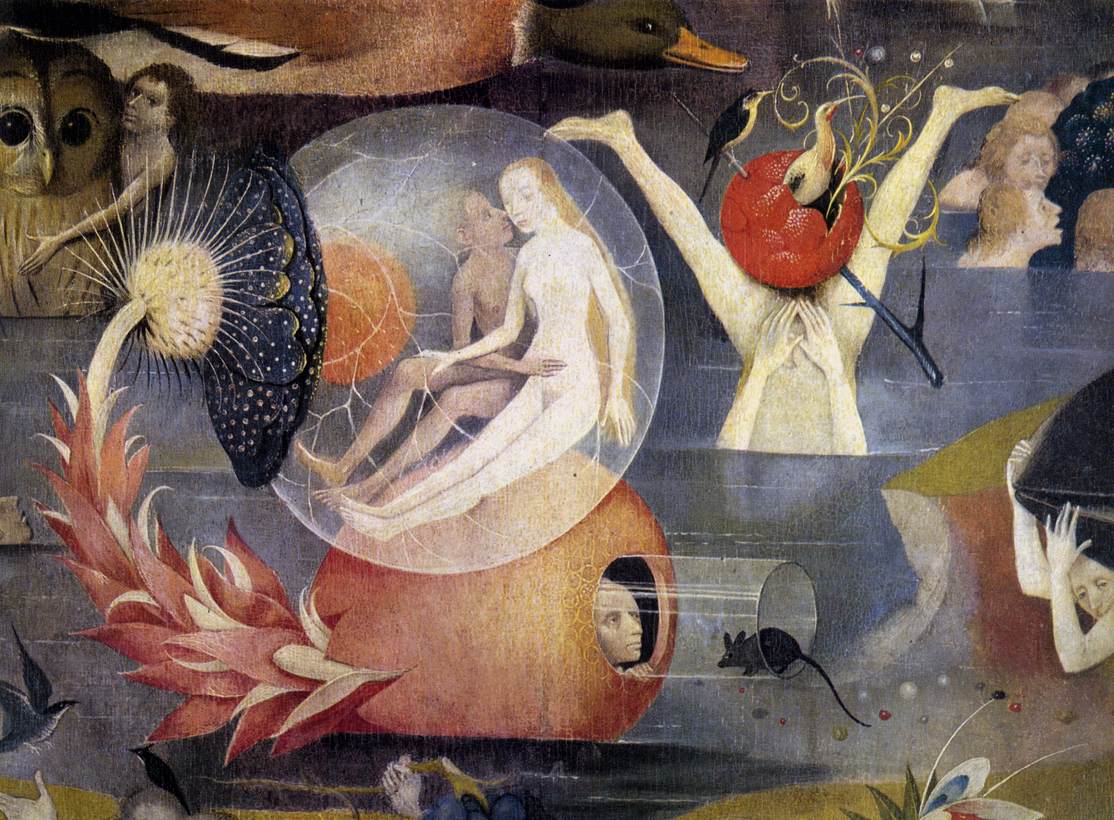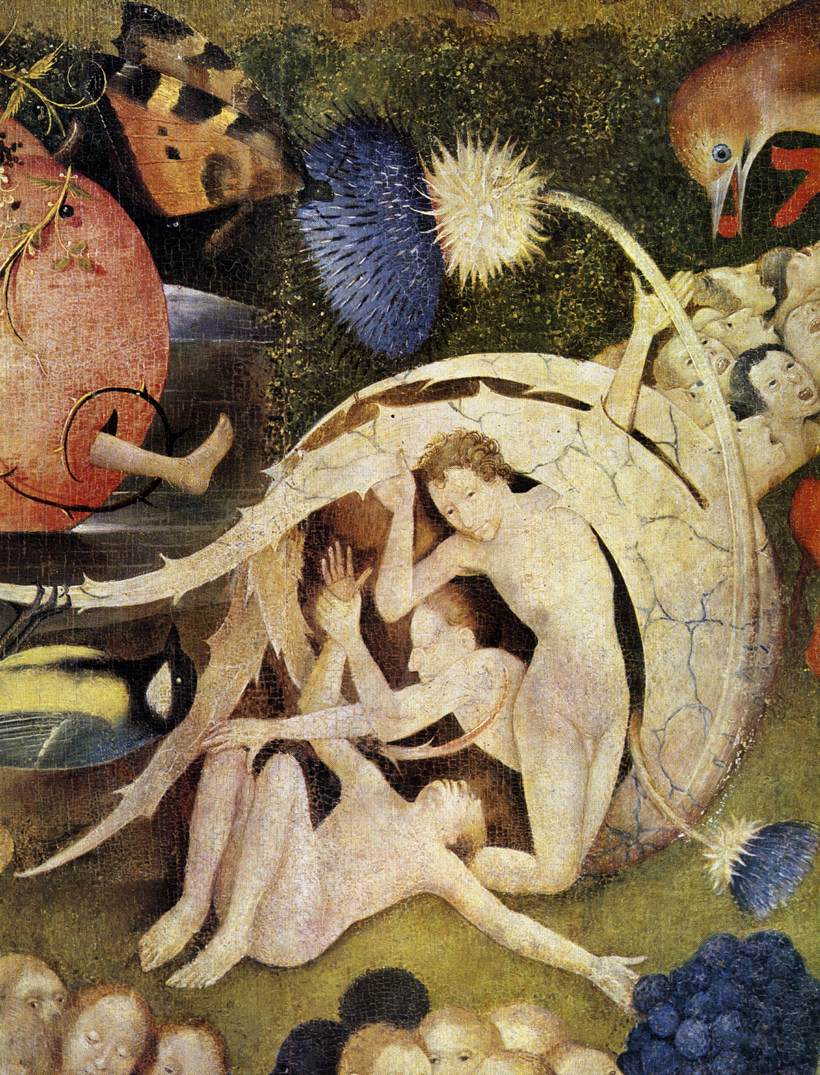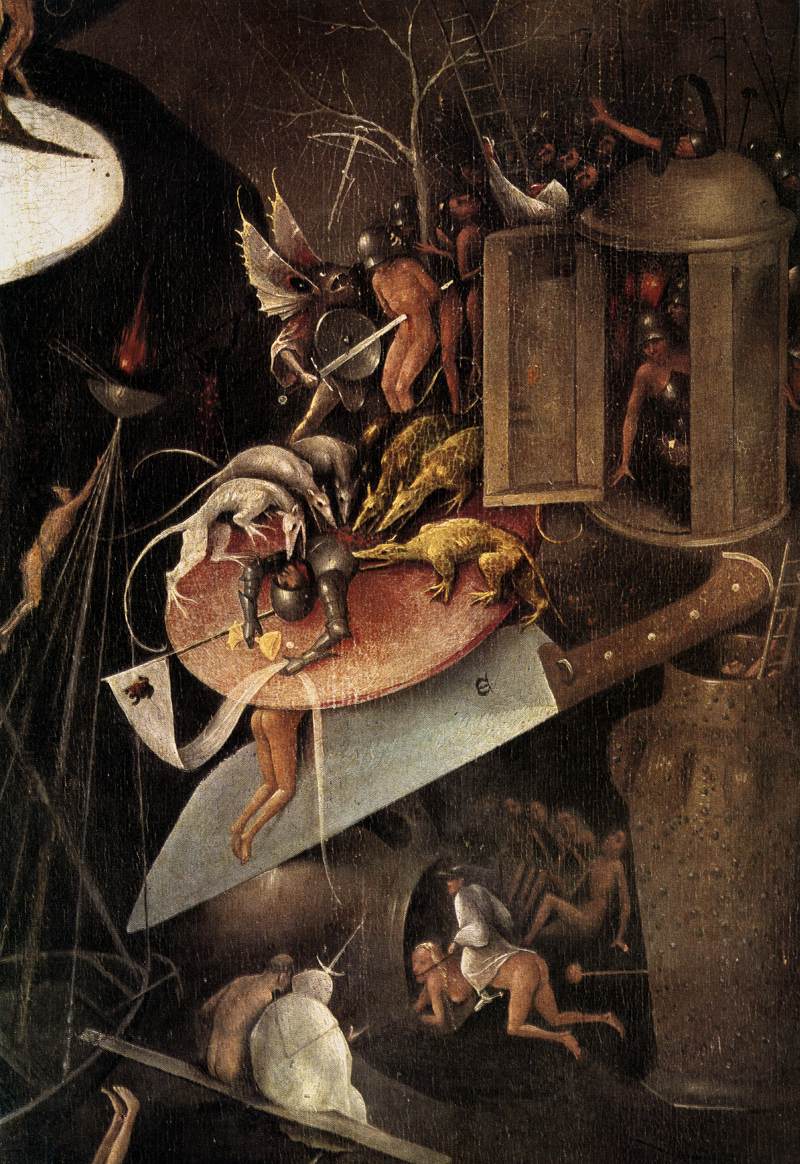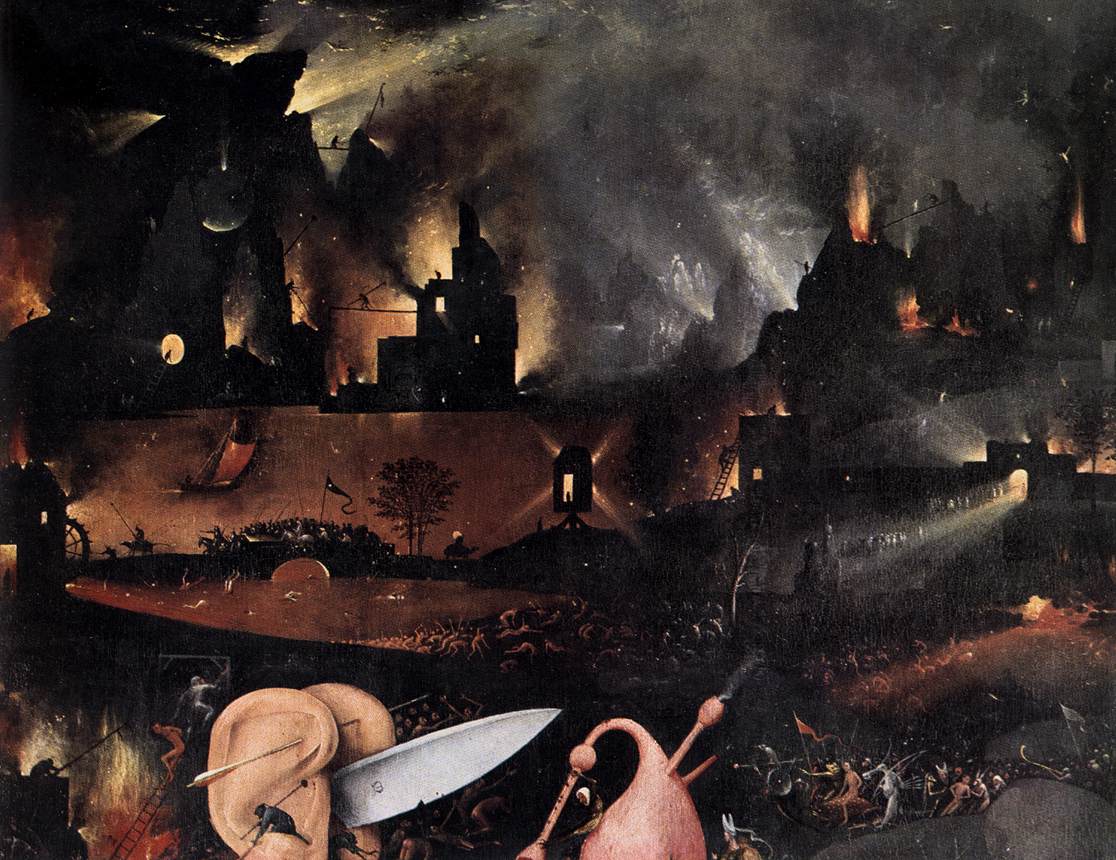.

Triptych of The Garden of Earthly Delights (detail): Hieronymus Bosch, c. 1500 (Museo del Prado, Madrid)
If there must be a god in the house, must be,
Saying things in the room and on the stair,
Saying things in the room and on the stair,

Triptych of The Garden of Earthly Delights (detail): Hieronymus Bosch, c. 1500 (Museo del Prado, Madrid)
Let him move as the sunlight moves on the floor,
Or moonlight, silently, as Plato’s ghost

Triptych of The Garden of Earthly Delights (detail): Hieronymus Bosch, c. 1500 (Museo del Prado, Madrid)
Or Aristotle’s skeleton. Let him hang out
His stars on the wall. He must dwell quietly.

Triptych of The Garden of Earthly Delights (detail): Hieronymus Bosch, c. 1500 (Museo del Prado, Madrid)
He must be incapable of speaking, closed,
As those are: as light, for all its motion, is;

Triptych of The Garden of Earthly Delights (detail): Hieronymus Bosch, c. 1500 (Museo del Prado, Madrid)
As color, even the closest to us, is;
As shapes, though they portend us, are.

Triptych of The Garden of Earthly Delights (detail): Hieronymus Bosch, c. 1500 (Museo del Prado, Madrid)
It is the human that is the alien,
The human that has no cousin in the moon.

Triptych of The Garden of Earthly Delights (detail): Hieronymus Bosch, c. 1500 (Museo del Prado, Madrid)
It is the human that demands his speech
From beasts or from the incommunicable mass.

Triptych of The Garden of Earthly Delights (detail): Hieronymus Bosch, c. 1500 (Museo del Prado, Madrid)
If there must be a god in the house, let him be one
That will not hear us when we speak; a coolness,

Triptych of The Garden of Earthly Delights (detail): Hieronymus Bosch, c. 1500 (Museo del Prado, Madrid)
A vermilioned nothingness, any stick of the mass
Of which we are too distantly a part.

Triptych of The Garden of Earthly Delights (detail): Hieronymus Bosch, c. 1500 (Museo del Prado, Madrid)

Triptych of The Garden of Earthly Delights (detail): Hieronymus Bosch, c. 1500 (Museo del Prado, Madrid)
Wallace Stevens: Less and Less Human, O Savage Spirit, from Transport to Summer (1947)
Tom,
ReplyDeleteStevens might well have been amused to see his words paired with these scenes (strange as they are), "Earthly Delights" indeed.
1.21
light coming into sky above still black
ridge, shadowed branches moving in wind
in foreground, sound of wave in channel
such as an image in fiction,
stood out like “color”
figure to be thought, frame
which occurs, in work
silver of low sun reflected in channel,
white clouds in pale blue sky by point
It is the human that is the alien
ReplyDeleteThe human that has no cousin in the Moon.
It is the human that demands his speech from beasts or from the incommunicable mass.
Such anti-humanism is a good strong antidote to all that orderly schmaltz talked about the human subject.
Nevertheless, I catch a breath at the words "incommunicable mass". What does Stevens, CEO, mean by that term? Is there a shift in meaning in the last line?
The Bosch is a perfect match, as good a representation of the house as you could get. I look at these images and wonder why that old fraud Dali ever bothered picking up a paintbrush.
Stevens was approximately as intimate a part of the mass as David Cameron is of the Spiral Nebula.
ReplyDeleteOoh, that Wally, he was -- as we players like to say in Vegas -- Money.
In fact... that's his wife Elsie who starred on the U.S. Mercury dime. See left side of third image from top here.
But as they used to say of any object or commodity equalling the Quantity of Nothingness (as vs. that of the ten cent piece), with that and a dime you can make a phone call.
But today one needs an Entire Technology to negotiate that simple operation.
There are those stories of Wally, with his annual winter vacations from the insurance corporation head office ( "The Hartford") always taken in the Deep South, and his casual scattering through his writings of the "N"-word -- see for example this rather famous bit, published in 1935 and now up again for all Americans to take pride in, on the website financed by an appropriately vast corollary corporate fortune (pharmaceutical this one, but really aren't they all one big conglomerate?) -- getting loaded, down in the Florida Keys, and duking it out with that other Major American Author, the legendary "Hem".
I like to think ol' Wal' would dip a mean swizzle stick into anything in a tall glass with a bit of fruit in it, kick back, and have a grand old time at Bosch's Garden Party.
I don't know if it's just been a long day, but somehow this surreal imagery and pairing feels like some of the recent news --
ReplyDeleteNot sure I am making any sense, or rather, sure I am not. But I do sometimes feel as if I am living in some surreal nightmare, waiting to wake up . . .
Nin,
ReplyDeleteAs the long day closes -- or is it indeed the next one beginning, not easy to tell any more -- your hallucination, Bosch's hallucination, and my hallucination all appear to be "on the same page", as they say.
When you dip a straight stick in water, it appears crooked. The images in the painting seem like that. "Normal" life bent out of shape by a sort of tipping of perspective, from the routine self-deception that allows us to endure everyday contemporary "reality", to that other, extremely unsettling warped-into-true view. I had the same feeling in the triage unit of the urban county hospital trauma center. Everything appeared totally insane, yet it was merely "business as usual" swirling about that stubborn still point at the center -- that is, what remained of one's mind. Since then a lot else has appeared very much like that, as if one's eyes had been at long last (probably far too late) washed clean. Revealing the world to be totally out of kilter.
In that sense, perhaps what we call "reality" is in fact just the hallucination, the water that never stops bending the stick.
"...any stick of the mass..."
I'm not what would be called a god-fearing person, at this stage of the game, but all the same I'd accept a bit of that fictive divine vermillioned nothingness any time. And when that ran out, I'd probably order up a second course.
But then I'm not the vice-president of The Hartford. In fact I don't even own one of those popular plastic get-out-of-reality cards.
"Nothing that is not there and the nothing that is"
ReplyDeleteThe snow man
That's a proper leap for January, all right.
ReplyDelete